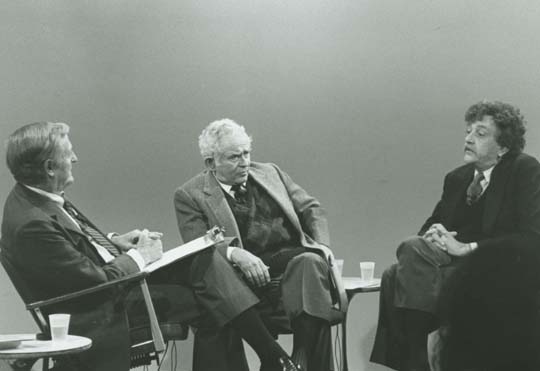At least outwardly, William F. Buckley was approving in the 1990s of Rush Limbaugh replacing him as the voice of Conservatism, believing he was to be succeeded by a more populist talker. Neither pundit, however, was really a driving force in American society. They were just well-positioned observers as responsible for political movements as alarm clocks are for the sun’s rise. Both were simply the noise accompanying the moment, as commentators almost always are.
Buckley and Gore Vidal and Norman Mailer and Germaine Greer were figures we used to call “public intellectuals,” although quite often they behaved like adult babies hurling balls of ego at one another. I don’t know we’re worse for their absence (though I grant that when Mailer wrote of technology, he was quite insightful).
As Garry Wills states in a NYRB piece, a single episode of The Daily Show or The Colbert Report did more to elucidate than every last insult and threat of fisticuffs from these supposed heavyweights.
From Wills:
A more ambitious project is Kevin M. Schultz’s Buckley and Mailer. He argues that the 1950s was a placid time narcotized by Eisenhower. But two radical voices, Buckley from the right and Mailer from the left, called out across the dreary middle ground, shaking things up—deep calling to deep, in Schultz’s telling. When chaos broke out in the 1960s, the two men pulled back from the violence they had created.
But had they created it? The upsetting of the old order was accomplished mainly by the civil rights movement, the feminist movement, and the anti-war movement. Those three things, and the vehement opposition to them, did the real churning of the waters; and Buckley and Mailer were only briefly and peripherally involved in them. The real troublemakers were people like Martin Luther King, Jr., Malcolm X, and James Baldwin, opposed by the likes of Strom Thurmond and George Wallace. Feminists like Gloria Steinem and Kate Millett were opposed to the pious legions of Phyllis Schlafly and Beverly LaHaye. On Vietnam, Benjamin Spock and Tom Hayden faced down Nixon’s hardhats and Edgar Hoover’s COINTELPRO. These deeply committed people with real followings had little time for the filigreed warblings of Buckley or Mailer. Deep to deep? Rather, flamboyant shallow to flamboyant shallow. Buckley and Mailer did not make history. They made good copy.•
Tags: Marshall McLuhan, Norman Mailer

